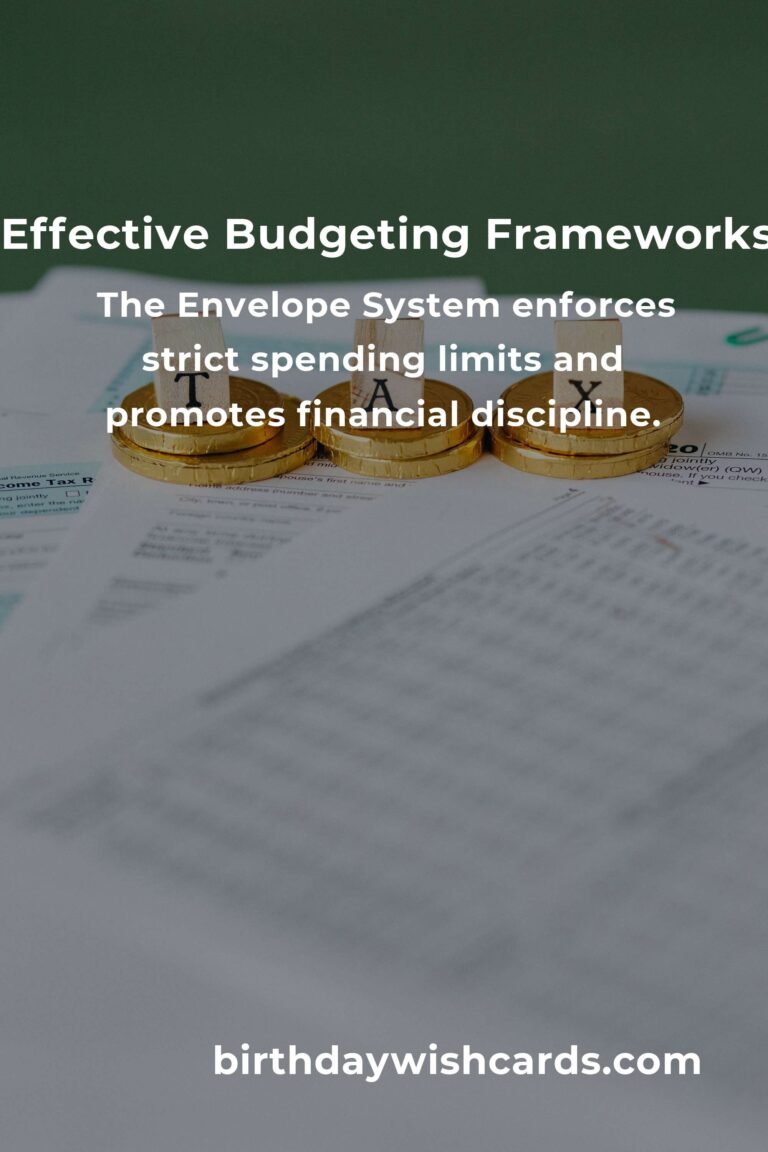
In the realm of personal finance, effective budgeting is critical for achieving financial stability and success. Budgeting frameworks provide structured methods to manage your finances, enabling you to allocate funds efficiently and meet your financial goals. This article explores the top 8 budgeting frameworks that can help you take control of your finances.
1. Zero-Based Budgeting
Zero-Based Budgeting is a method where every dollar of your income is allocated to specific expenses, savings, or debt repayment. This method ensures that no money is left unaccounted, promoting mindful spending. By starting from zero, you justify every expense, which can lead to better financial discipline.
2. 50/30/20 Rule
The 50/30/20 rule is a simple budgeting framework dividing your after-tax income into three categories: 50% for needs, 30% for wants, and 20% for savings and debt repayment. This framework offers flexibility while ensuring that essential expenses and savings goals are prioritized.
3. Envelope System
Popularized by financial guru Dave Ramsey, the Envelope System involves allocating cash into envelopes designated for different spending categories. Once the cash in an envelope is spent, no more spending is allowed from that category, enforcing strict spending limits and promoting financial discipline.
4. Pay Yourself First
The ‘Pay Yourself First’ approach emphasizes prioritizing savings by setting aside a certain amount of money for savings before handling other expenses. This framework encourages building savings and investments by treating them as non-negotiable expenses.
5. Line-Item Budgeting
Line-Item Budgeting involves creating a detailed list of income and expenses, tracking each line item meticulously. This framework provides a clear view of where your money goes, allowing for precise adjustments to improve financial health.
6. Incremental Budgeting
Incremental Budgeting is a method where the previous budget is used as a base, and incremental changes are made for the next period. This framework is useful for those with steady income and expenses, allowing for gradual adjustments and improvements.
7. Value-Based Budgeting
In Value-Based Budgeting, you prioritize spending based on personal values and priorities. This method encourages thoughtful decision-making, ensuring your spending aligns with what truly matters to you, leading to more fulfilling financial management.
8. The Balanced Money Formula
Proposed by Elizabeth Warren, the Balanced Money Formula divides income into three categories: 50% for needs, 20% for savings, and 30% for wants. This method provides a balanced approach, ensuring that financial stability is maintained while allowing room for lifestyle enjoyment.
Each of these budgeting frameworks offers unique advantages and can be tailored to fit individual financial circumstances. By selecting a budgeting method that aligns with your financial habits and goals, you can enhance your financial management and work towards financial freedom.
Conclusion
With a variety of budgeting frameworks available, it’s important to choose one that matches your lifestyle and financial objectives. Whether you prefer the structure of Zero-Based Budgeting or the flexibility of the 50/30/20 rule, implementing a budgeting framework can significantly improve your financial health and pave the way for a prosperous future.
Budgeting frameworks provide structured methods to manage your finances. Zero-Based Budgeting ensures that no money is left unaccounted, promoting mindful spending. The 50/30/20 rule offers flexibility while prioritizing essential expenses and savings goals. The Envelope System enforces strict spending limits and promotes financial discipline. ‘Pay Yourself First’ encourages building savings by treating them as non-negotiable expenses. Line-Item Budgeting allows for precise adjustments to improve financial health. Incremental Budgeting is useful for those with steady income and expenses. Value-Based Budgeting ensures your spending aligns with what truly matters to you.
#Budgeting #FinancialManagement #PersonalFinance #MoneyManagement #Savings

